Overview
Engagement software accounting is pivotal in enhancing communication, streamlining operations, and ensuring compliance within accounting firms. This software not only elevates client interactions—evidenced by a remarkable 40% increase in response rates and a significant 50% reduction in response times—but also secures data management and automates compliance processes. In today’s rapidly evolving financial landscape, it is essential for firms to adopt these tools to remain competitive and efficient.
Introduction
In the dynamic world of accounting, effective communication and operational efficiency are paramount. Engagement software has emerged as a game-changer, bridging the gap between accountants and their clients while streamlining workflows and ensuring compliance.
Platforms like Glasscubes are at the forefront of this transformation, offering tools that not only enhance client interactions but also significantly boost productivity. With the accounting software market projected to grow to $11.8 billion in the coming years, the adoption of such technologies is no longer optional; it is essential for firms looking to thrive in a competitive landscape.
By automating processes, improving transparency, and fostering stronger client relationships, engagement software is redefining the accounting experience and paving the way for a more efficient and secure future.
Defining Engagement Software in the Accounting Sector
Engagement software accounting in the finance sector encompasses specialised tools designed to enhance communication between accountants and their clients. Such platforms exemplify these advantages by streamlining information collection, managing customer interactions, and ensuring compliance with regulatory standards. Accounting firms frequently encounter challenges, including confusion from multiple email threads, duplicated requests, and the risk of misplaced responses.
With features like secure, real-time interaction management and automated reminders, Glasscubes markedly enhances efficiency and satisfaction within accounting firms. By reducing response times by 50% and boosting user interaction by 40%, this user-friendly platform empowers accountants to handle requests seamlessly while maintaining clear visibility throughout the audit process. As Steve Baxter, Audit & Accounts Manager at MGI Midgley Snelling, remarked, ‘We’re getting quicker responses from clients, and our team appreciates the transparency of having everything in one place.’
As the financial software market is projected to reach $11.8 billion over the next eight years, adopting such tools becomes imperative. Furthermore, over 50% of finance executives anticipate that automated and intelligent financial systems will significantly impact their organisations in the coming decades, underscoring the vital role of collaboration software. This transition not only improves accountant-client communication but also enhances operational efficiency and overall service delivery.
Moreover, integrating engagement software accounting with outsourced finance and bookkeeping services equips firms with the agility necessary to navigate complexities while concentrating on core operations. Additionally, automation mitigates fraud risks by improving transaction transparency and enforcing compliance, further highlighting the importance of these tools in safeguarding financial transactions.
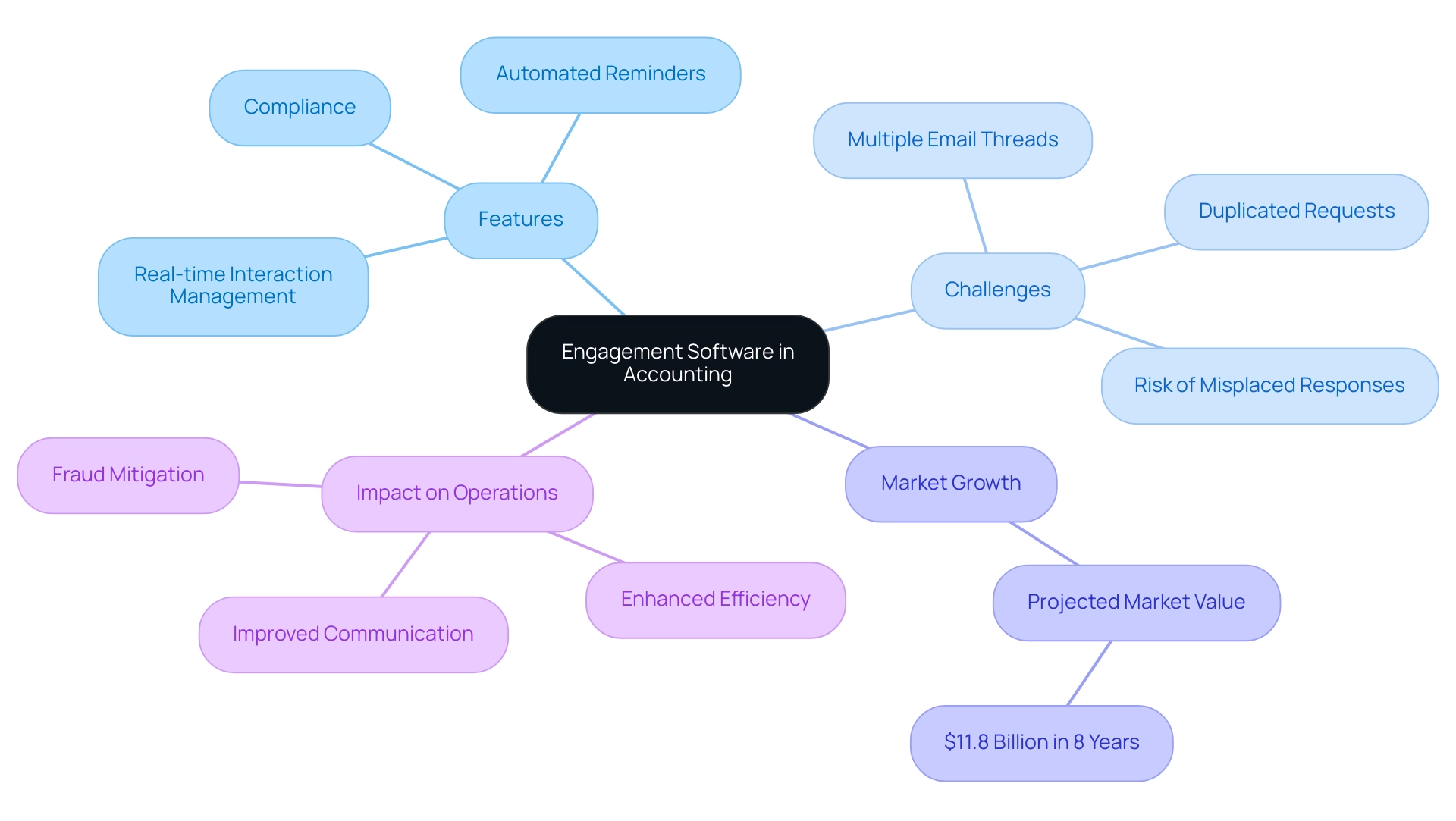
Key Benefits of Engagement Software for Accountants
Engagement software accounting is revolutionising the accounting landscape, offering a multitude of advantages that significantly enhance communication, streamline operations, and ensure compliance. Companies leveraging this platform have reported a remarkable 40% increase in customer response rates and a 50% reduction in response times. Such statistics underscore the power of automated reminders and real-time reporting, allowing accountants to focus on higher-value tasks rather than the monotonous process of information follow-ups.
Steve, an audit manager at MGI, noted that since adopting the new platform, their team has greatly valued the clarity provided by having all information centralised in one secure location, thereby enhancing customer engagement. Clients can effortlessly access the platform to view outstanding queries, leading to faster uploads and responses, which benefits the audit team tremendously. This strategic shift not only conserves precious time but also cultivates stronger relationships, as clients feel more engaged and valued throughout their interactions with financial professionals.
Prior to implementing Glasscubes, concerns about customer involvement and the ease of information uploads were prevalent; however, these concerns were alleviated as users engaged thoroughly with the platform. In a rapidly evolving sector, where the global financial software market is projected to reach $11.8 billion in the next eight years, the adoption of interaction software is becoming essential for companies aiming to enhance their operational efficiency and customer satisfaction. Moreover, over 50% of accounting executives anticipate that the emergence of automated and intelligent accounting systems will profoundly influence accounting firms over the next 30 years, underscoring the growing significance of these tools.
Real-world testimonials from companies that have integrated the software further illustrate the tangible benefits of engagement tools, highlighting their role in boosting customer response rates and overall involvement. Additionally, Glasscubes effectively addresses the limitations of email communication, ensuring that responses are organised and readily accessible, thereby enhancing overall efficiency.
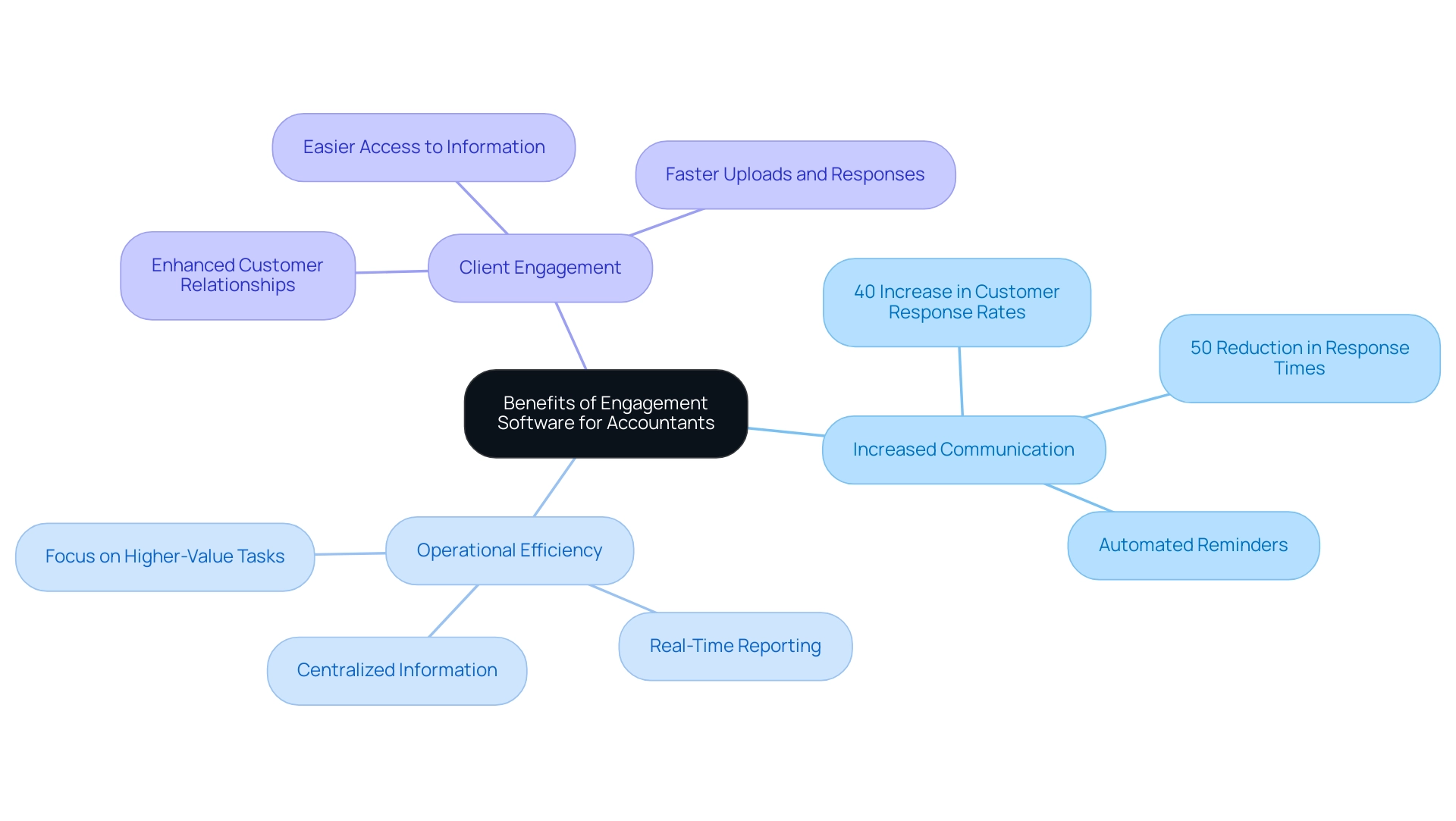
Enhancing Client Communication Through Engagement Software
Engagement software significantly enhances user communication by providing a secure and intuitive platform for interactions. Traditional email communication often lacks visibility on responses and can lead to duplicated requests, making it challenging to manage engagements effectively. Glasscubes addresses these issues with features like automated reminders that can be customised and scheduled to optimise communication, significantly reducing the chances of missed responses.
This feature enables companies to send an unlimited number of reminders with customisable messages, ensuring customers are consistently informed about their requests. Coupled with real-time updates and a centralised customer portal, engagement software accounting empowers accountants to engage efficiently with their customers. For example, Glasscubes facilitates secure document exchanges, effectively minimising miscommunication risks and ensuring transparency.
This transparency not only boosts customer satisfaction but also fosters trust, as customers appreciate the proactive communication approach. Significantly, 62% of complaints are associated with staff attitudes and competencies, highlighting the essential role of effective communication in reducing customer dissatisfaction. Companies utilising engagement software accounting have reported significant enhancements, with 40% experiencing higher customer response rates and 50% noticing a decrease in response times.
Moreover, as Sophie Montgomery from TaxAssist Accountants noted, her firm saved an impressive 288 hours in just one tax season due to streamlined processes. These advancements emphasise the revolutionary influence of technology in financial practices, reinforcing the necessity for firms to embrace innovative solutions to meet contemporary customer expectations. Furthermore, faster-growing companies derive 40% more revenue from personalisation than their slower-growing counterparts, illustrating the financial benefits of implementing engagement software accounting in financial practices.
Importantly, the platform is secure, encrypted, and GDPR compliant, providing peace of mind for companies and customers alike, and eliminating uncomfortable discussions around costs due to late information supply.
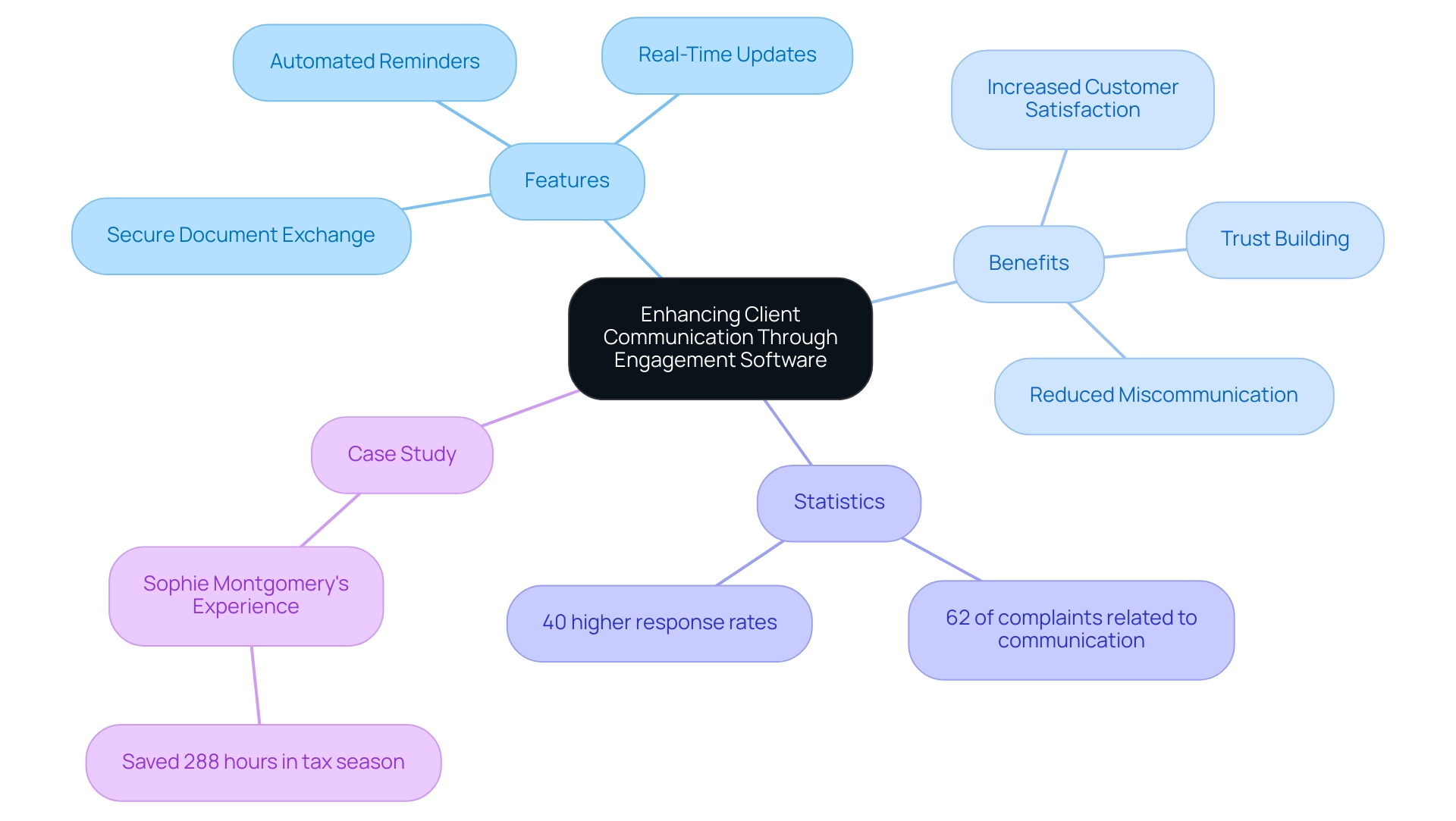
Streamlining Workflows and Increasing Efficiency with Engagement Tools
Engagement software accounting serves as a cornerstone in optimising workflows within accounting firms, automating repetitive tasks and centralising customer information. This platform significantly enhances customer interaction, empowering accountants to manage an unlimited number of requests and storage, thereby overcoming the usual constraints of traditional email systems. Such capabilities not only reduce the time accountants dedicate to follow-ups—cutting response times by an impressive 50%—but also diminish errors commonly linked to manual processes.
For example, Sophie Montgomery from TaxAssist Accountants reported a remarkable 288 hours saved in a single tax season, illustrating the tangible benefits of these tools. By integrating collaboration software into their operations, firms can substantially elevate productivity, enabling them to cater to more clients while focusing their efforts on strategic initiatives rather than administrative duties. The platform includes automated reminders that pursue clients for outstanding requests, ensuring that nothing is misplaced or overlooked, complemented by real time tracking through a visual progress report that clearly delineates pending queries.
With 80% of organisations poised to embrace intelligent automation by 2025, the importance of engagement software accounting tools in driving efficiency within the financial sector is undeniable. Additionally, this service provides a secure, user-friendly platform compliant with ISO27001 and GDPR for data security, reinforcing its commitment to delivering a reliable solution for financial firms, free from the complications of delayed information affecting costs.
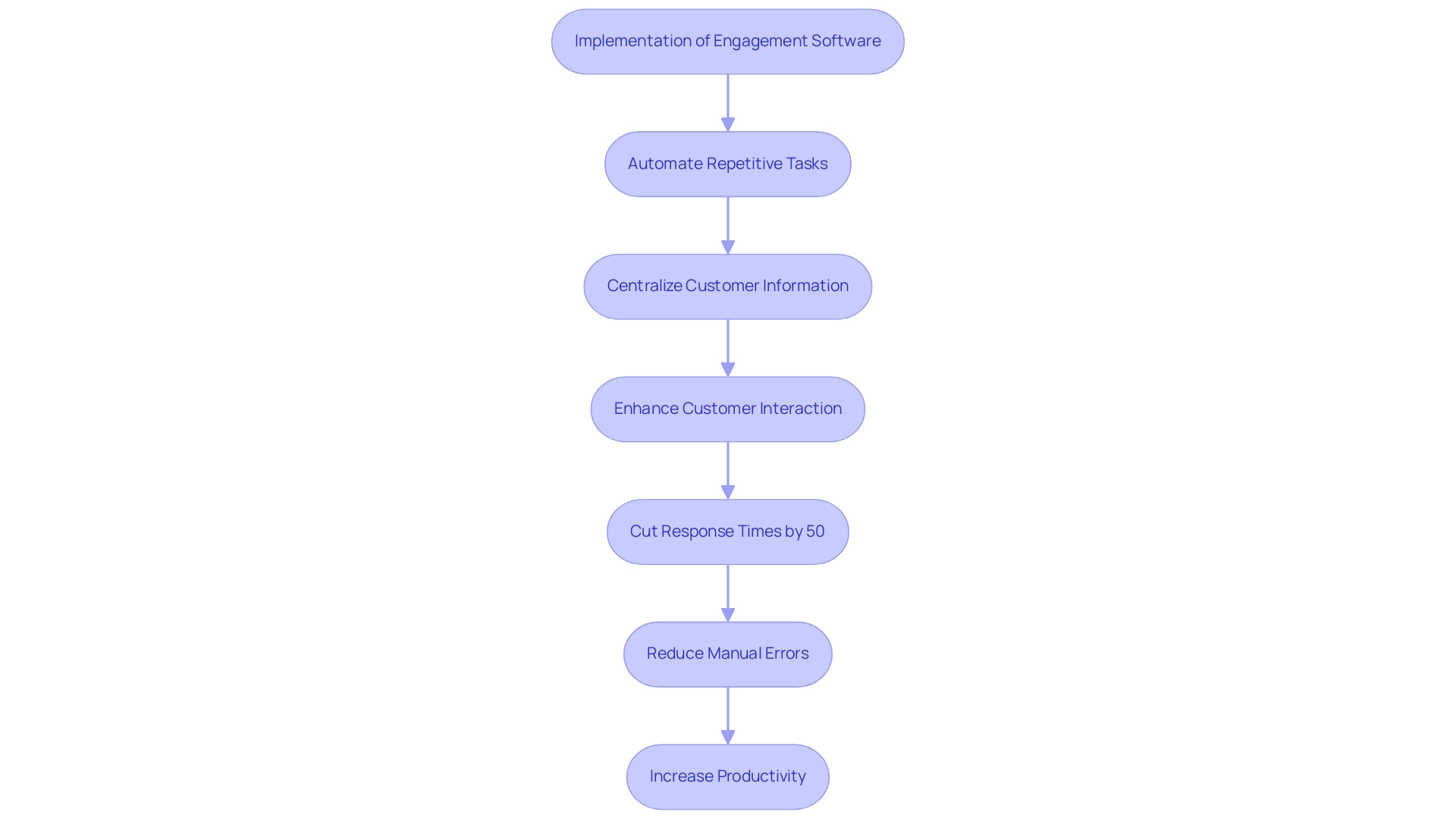
Ensuring Compliance and Security in Accounting Engagement Software
Engagement software accounting is crucial for ensuring compliance and security within accounting firms. Solutions like Glasscubes are meticulously crafted to meet GDPR standards, establishing a secure framework for managing sensitive customer data. By automating compliance checks, introducing robust security protocols, and implementing automated reminders, engagement software accounting significantly mitigates the risks of data breaches and regulatory non-compliance.
This proactive strategy not only safeguards customer information but also bolsters the firm’s reputation; clients are increasingly inclined to trust firms that prioritise security and compliance in their operations. As audit manager Steve from MGI observed, transitioning to the new platform has resulted in faster client responses and enhanced transparency, enabling audit teams to efficiently track outstanding requests in real time. Unlike traditional email communication, which often leads to lost information and repeated requests, this platform organises responses and preserves all correspondence within each audit request.
A concerning statistic highlights that 53% of businesses leave over 1,000 files containing sensitive data accessible to all employees, underscoring the pressing need for secure data management practices. Furthermore, as Theresa Rex noted in early 2022, 51% of accounting firms identified ‘keeping up with regulatory change’ as their primary challenge, emphasising the necessity of adopting engagement software accounting focused on compliance solutions. Additionally, implementing best practices in compliance can yield significant cost savings, with businesses saving an average of £3.01 million through centralised data governance programmes.
This financial incentive underscores the importance of engagement software accounting in ensuring compliance while enhancing operational efficiency through streamlined communication and improved customer interaction. With 57% of accountants believing that technology literacy is vital for future success, tools such as collaborative platforms offer real-time visibility into request statuses, solidifying client relationships and strengthening firms’ positions in an increasingly competitive landscape.
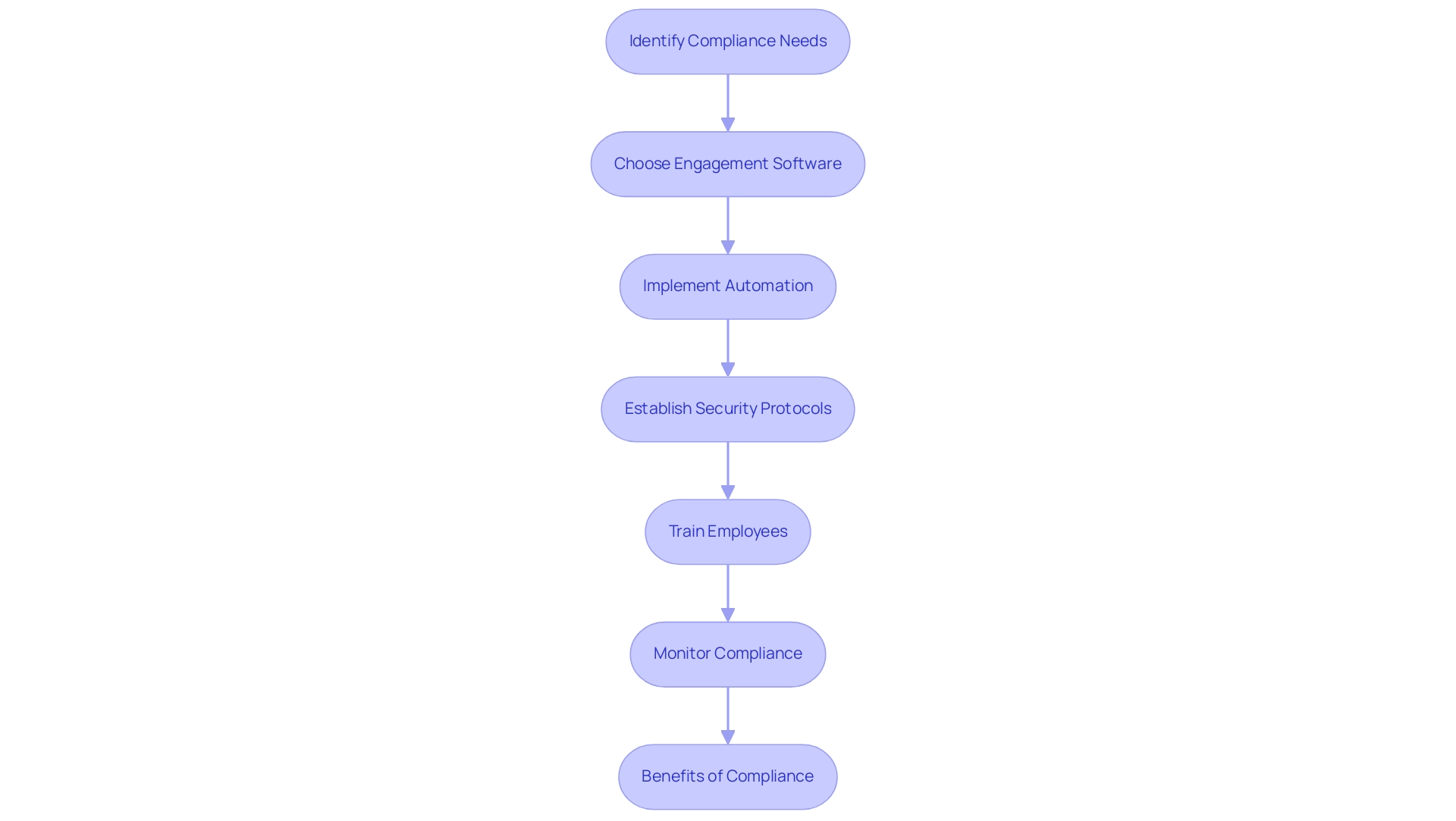
User Experience: The Importance of Intuitive Design in Engagement Software
User experience stands at the forefront of successful engagement software accounting adoption, particularly within the accounting sector. An intuitive design empowers accountants to navigate the engagement software accounting platform effortlessly, significantly minimising the learning curve while enhancing overall satisfaction. Glasscubes exemplifies this principle through its user-friendly interface, which eliminates the need for extensive training and enables accountants to utilise the software from the outset.
This straightforward usability not only boosts productivity but also fosters greater user involvement with engagement software accounting, as users value the simplicity of interacting with the platform. As Steve, an audit manager at MGI, states, ‘We are receiving quicker replies from customers and our team appreciates the transparency of having everything in one place.’ This sentiment underscores the advantages of employing intuitive design in engagement software accounting tools, illustrating how the company has transformed its audit procedures by enhancing communication and boosting customer engagement.
Prior to adopting the platform, teams frequently encountered challenges with information being lost in lengthy email threads and duplicated requests from various members, resulting in confusion and inefficiencies. With engagement software accounting providing automated reminders and a secure, organised workspace, firms can significantly reduce response times by 50% and enhance customer interaction by 40%. Glasscubes is designed to be secure, encrypted, and GDPR compliant, offering peace of mind for both firms and their clients.
Furthermore, with the global market for engagement software accounting projected to reach $11.8 billion within the next eight years, the importance of user-friendly software cannot be overstated. As companies face a 7.8% decline in finance graduates from 2021 to 2022, implementing engagement software accounting with intuitive designs becomes crucial for improving workflows and maintaining strong customer relationships in a competitive landscape.
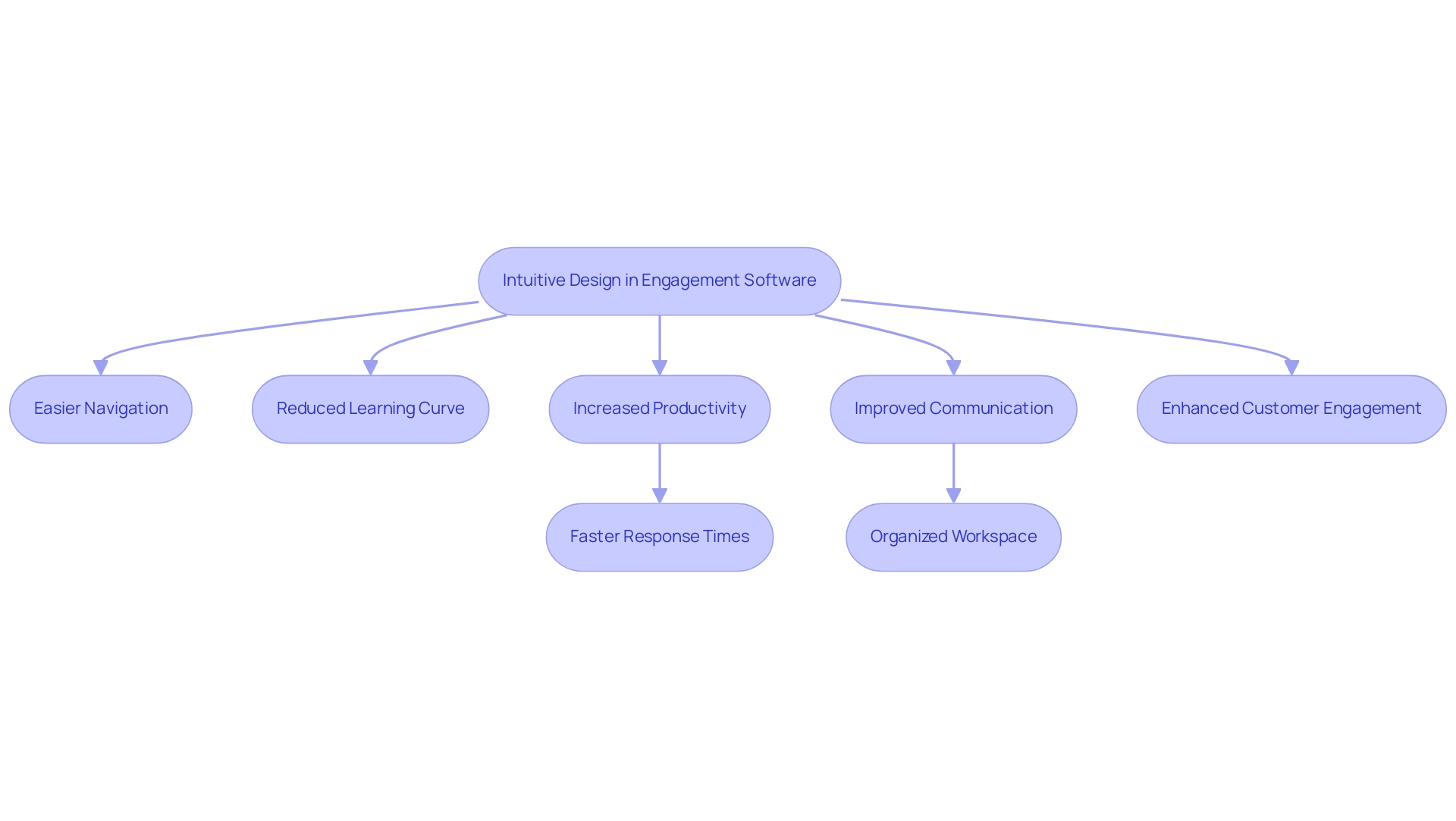
Future Trends in Engagement Software for the Accounting Industry
The accounting sector stands on the cusp of a transformative shift in software, propelled by advancements in artificial intelligence and machine learning. These technologies are poised to enhance automation capabilities, significantly boosting efficiency in customer interactions and data management. This evolution is exemplified by companies employing automated communication tools, user portals, and streamlined workflows, empowering accountants to enhance customer engagement effectively.
As remote work solidifies its place as a lasting norm, engagement software will increasingly emphasise seamless collaboration between accountants and clients, regardless of their physical locations. Firms that proactively embrace these technological trends, such as those offered by Glasscubes, will not only satisfy the evolving demands of their clientele but also secure a competitive edge in a rapidly transforming marketplace. This evolution is underscored by the belief of over 50% of accounting executives, who foresee that the development of automated and intelligent accounting systems will profoundly impact businesses in this sector over the next three decades.
Moreover, 85% of accountants assert that the profession must accelerate technology adoption, highlighting the urgency of these changes. Real-world examples, such as the impressive 288 hours saved by Sophie Montgomery of TaxAssist Accountants in a single tax season through effective customer interaction solutions, further illustrate the tangible benefits of embracing such technologies. Additionally, with Karbon experiencing a growth rate of 40% to 50% year-over-year, the trend signals a robust demand for engagement software accounting solutions like those provided by Glasscubes.
As the landscape continues to evolve, embracing these innovations will be essential for accounting firms seeking to enhance their client engagement strategies and operational efficiency.
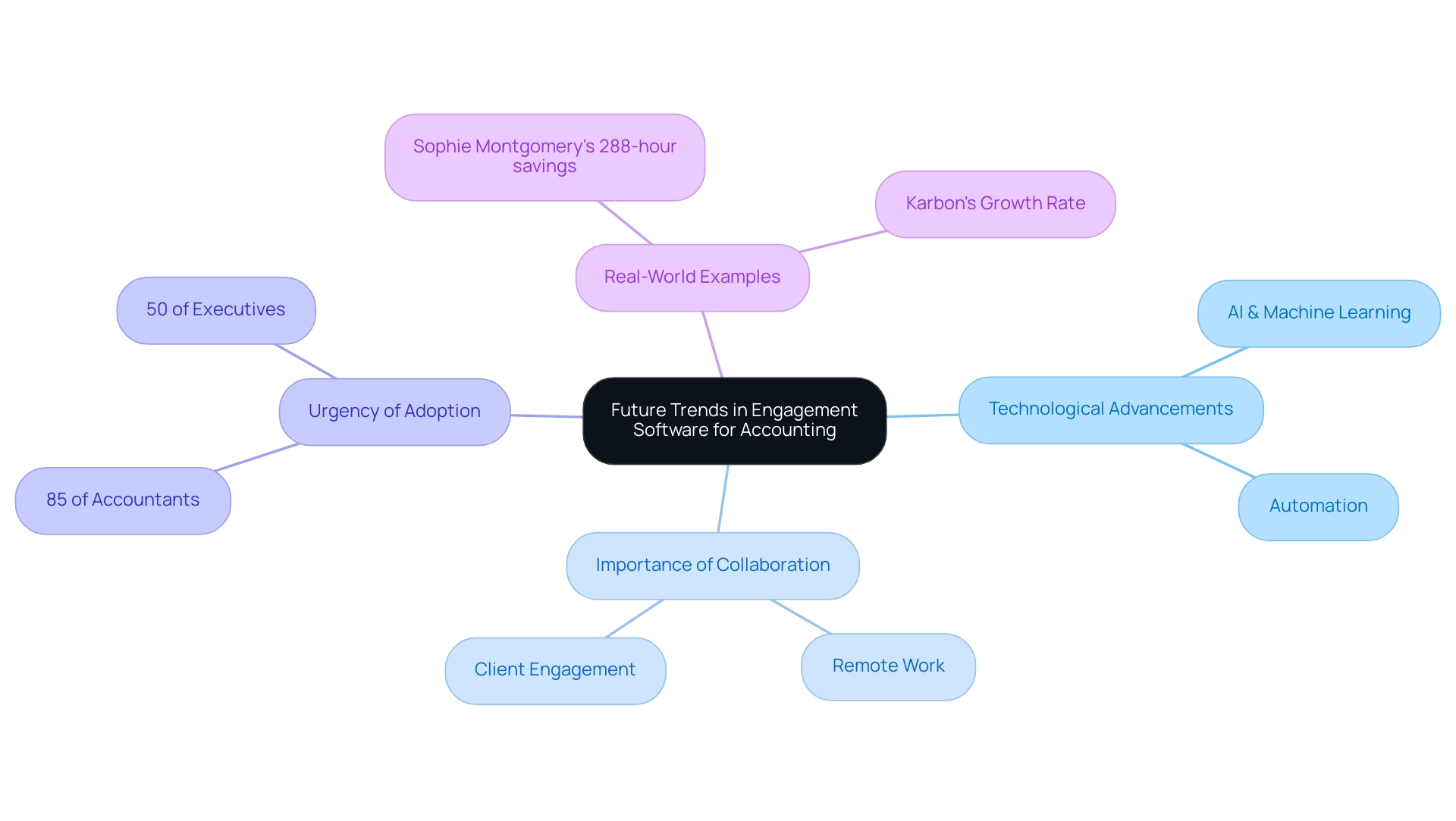
Conclusion
Engagement software is revolutionising the accounting industry by bridging communication gaps and enhancing operational efficiency. Tools like Glasscubes not only streamline workflows but also significantly improve client interactions, leading to a notable increase in response rates and a reduction in response times. By automating repetitive tasks and providing a secure platform for communication, these solutions empower accountants to focus on high-value activities while ensuring compliance and security in handling sensitive data.
The benefits of adopting engagement software extend beyond improved client satisfaction; they also contribute to the overall productivity of accounting firms. As the market for accounting software is projected to grow significantly, firms that embrace these technological advancements will be better positioned to thrive in a competitive landscape. With over half of accounting executives recognising the transformative potential of automation and intelligent systems, the urgency for firms to adapt is clear.
Looking ahead, the integration of artificial intelligence and machine learning into engagement software promises to further enhance efficiency and collaboration within the accounting sector. As remote work becomes increasingly common, the need for intuitive and effective engagement tools will only grow. By investing in such technologies now, accounting firms can secure a competitive edge and ensure they are well-equipped to meet the evolving needs of their clients in the future.
